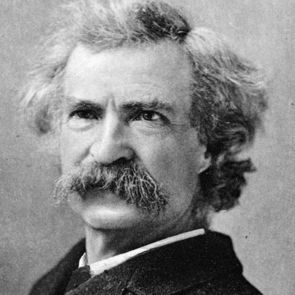 …I’m not, really, but I suspect I’m going to get one anyway.
…I’m not, really, but I suspect I’m going to get one anyway.
Go read this article. It’s okay, I can wait and the article’s short.
You didn’t click on the link, did you.
Sigh. People nowadays.
That’s okay, actually, as this article’s really easy to nutshell and isn’t very complicated: a high school in Philadelphia has decided to stop teaching The Adventures of Huckleberry Finn in their eleventh-grade language arts classes, primarily because of the book’s repeated (over 200 times, apparently) use of the N-word. Predictably, folks are mad.
I feel like this is the part where I should start establishing my Twain bona fides. I’ve read Finn and Sawyer repeatedly. His Fenimore Cooper’s Literary Offenses is one of the greatest pieces of writing in the history of the English language. And I have read a ton of Twain outside of those three pieces, although obviously those are the big ones.
(Takes deep breath)
I’m good with this, guys.
Lemme be real specific, here: I’m not saying whether Finn should or shouldn’t be taught in high schools. I’m saying that I’m okay with the decision made by this high school that the difficulties introduced by the language in the book outweigh the literary benefits of making the kids all read it. I note that the book will remain in the library, where kids who want to read it can still easily access it. And that, to me, makes an immense amount of difference.
Here is the thing, and it’s one of the most wonderful things about literature: I am absolutely certain that I will die without running out of things to read. Absolutely certain. I will die regretting never having had read something. And that’s speaking as someone who reads 125-150 books a year. The median number of books read by adults per year in the United States, a number in this case more useful than the average, is five.
In other words, there are lots and lots and lots and lots and lots of books that high school students could be reading as part of their English classes. Several of them are even by Twain. Even more are from the same time period as Twain, and cover similarly pedagogically-useful material! Relatively fewer guarantee that you’ll have to spend sizeable chunks of your class time debating whether your kids have to or should read the word nigger out loud if for some reason they have to read something out loud.
(Yes, it’s still useful for high school students to have something read to them from time to time. Choral or turn-based reading, maybe not, especially at the class level, but even a class with no out-loud reading at all will surely have to repeat a passage every now and again while discussing it.)
Is Huckleberry Finn one of the foundational works of American literature? Hell yes. Should everyone– American or otherwise– read Huckleberry Finn? Yes. Eventually.
I have more trouble with the suggestion that everyone must read Huck Finn while 1) in high school and 2) under the auspices of an English teacher. Pull Huck from your library? Make it unavailable in bookstores? You and me, we gon’ fight. Pull it from a college curriculum? Less defensible, since those kids generally have a lot more leeway about what classes they’re taking.
But I just can’t get mad that a high school has decided that this one book isn’t worth the effort of the external issues it brings with it. I almost feel like it’s better taught in history classes anyway, where the social milieu of the book can be discussed more fully, and hopefully by people a bit more qualified to do so. (At this point I laugh, because I know full well that the first name of most high school history teachers is “Coach,” but I also know I had a couple of really good ones.)
So, yeah. Feel free to call me an asshole in comments now. I think I’m okay with this.

I think Huck Finn can work really, really well in a classroom. And I think that teachers should be allowed to use it in their curriculum, though I don’t think they should be forced to. Because if you can get kids to unpack it, there’s a lot to talk about….Which is why I would wait to introduce it in college, at the freshman level probably. There are lots of literary devices, and it’s definitely a novel in which you feel that the writer is Up To Something.
I tend to think we’re doing literature all wrong in high school. I don’t know what the solution is, exactly, but it involves letting go of the literary canon in a way that traditional education just doesn’t seem ready to do.
LikeLike
Teaching English is the hardest teaching job, period. I’ve never been very good at it. And yes, there’s DEFINITELY all kinds of fruitful discussions to be had about Huck, but I can still understand why schools might want to avoid it. Just the fact that it gives the white kids /white teachers in the room license to say the N-word is problematic enough, because folks tend to try to take a mile when given an inch. College, like I said, is different.
LikeLiked by 1 person
Yeah, I think we’ve reached a point where some things are being taught way too early and some things not nearly early enough because we’ve hung onto the literary canon.
LikeLike
Hey, those schools can join the suffering of thousands of UK kids who have to analyse, in excruciating depth, Shakespeare. It’d give us something in common to grumble about, and we Brits do love a good grumble.
LikeLike
We typically get Shakespeare in high school around here too. I know I read at least Romeo and Juliet, Macbeth, and Hamlet before graduating, and I feel like there was probably one more. Midsummer Night’s Dream, maybe?
LikeLike
In Primary School we studied Hamlet, in secondary school we studied a single scene (the banquet scene) from Macbeth for ages. We had to do plays on it, analyse it. I came to hate that scene.
LikeLike
Our city does Shakespeare every year in high school. Romeo and Juliet freshman year. MacBeth sophomore year. Hamlet and Othello Junior year but I basically missed Junior year anyway. Midsummer Night’s Dream is supposed to be senior year, I think…
Anyway, yeah, I don’t really care if Huck Finn is off the official curriculum as long as the book is still available in the library. Much more concerned with censorship of high school libraries, myself.
LikeLike
stinky’s class is doing huck finn this year, and as such i have a brand spanking new copy of it sitting [ahem… somewhere… trust me, i’ll find it again when the time comes… shut up] because i never read it in hs myself (though other classes did, and also let’s not forget that i didn’t read most of the stuff MY class did, either, so really that’s not saying much at all) and i like to know what she’s reading – the point being that i didn’t know what to expect from it, and was therefore really surprised when i was shopping for it to learn that there are apparently versions out there that have altered the language so as to be less potentially inflammatory. and i was all, wut.
i guess my concern about removing things from the curriculum, whatever they are, is that there should be a more concrete reason for it than ‘the community costs’. what is it costing the community? saying i don’t feel comfortable with X isn’t a high enough cost, i don’t think. i really believe we’ve gone waaay overboard with the whole trigger-warning-safe-space-my-beliefs-blah-dee-blah thing where if anyone in the room notices their palms getting a little damp the entire discussion is scrapped because reasons. it seems to me that’s what should happen, because that’s where the real lessons are. of course huck finn isn’t necessary reading, and even without ever having opened it i can guarantee it doesn’t teach anything you couldn’t learn from countless other books instead, but i think the important teaching moment isn’t ‘oh, you feel uncomfortable, i’m sorry’ but rather ‘of course you feel uncomfortable. now let’s talk about WHY.’ (and i’m setting aside entirely the question of where you draw the line… your ‘theory of evolution’ makes me uncomfortable, so we should probably toss that, too, you know?) having the books available for those who would seek them isn’t nothing, but i think it also ignores the question of how many kids are really likely to do that? i don’t think i would ever have read this on my own; i’m only planning to now because evie’s gonna – because it’s part of the curriculum. and how do you know that it should or shouldn’t be part of the curriulum unless you’ve read it. and would you have read it if it wasn’t part of the…
i dunno. i honestly have no real opinion on whether this book is important enough to be required reading (or if in fact ANY book is; we’re all gonna define importance for ourselves anyway, but having a relatively inclusive base to start with is kind of helpful, probably) but i do think that the reasoning needs to be pretty well thought out, and very clear, and based on more than feeeelingz, because that shit leads nowhere good, a lot of the time. (fwiw, evie’s reading it as part of her american studies class, which is an honors course that includes both her english and history classes with an integrated curriculum. so yeah, also what you said. there are ways to make things make more sense to more people, that don’t involve just saying fuck it, i’m out.) i’ma shut up now.
LikeLiked by 1 person
I think i prefer this to the “sanitizing” of the original story at least…
LikeLike
Agreed.
LikeLiked by 1 person
I think it’s a reasonable compromise. The book is still available, it’s just no longer a scholastic focus. As you noted, there are plenty of other worthy books that can take its place in the curriculum.
LikeLike
Okay, you had me at most social studies teachers being called “Coach” because…yeah it is too true and little is said of that outside of school teachers.
Love Twain as well mainly for his on your face smart sass. 🙂
LikeLike
I had a fight along the same lines with a senior American academic (about the Huck Finn in schools). He was unable to believe that I wouldn’t see how right he was to affirm that great literature trumped an individual’s feelings every time. Like you, I said the library is a fine place for the text, University is an appropriate place to study it, but school-age kids have un-myelinated brains, and this means their understanding is different. Besides which, there is no way we, as white guys, can gauge how much the ‘N’ word affects someone of another colour.
(Started Malumba today in a hospital waiting room… I have two other books to finish first, but is as good reading as I expected.)
LikeLiked by 1 person